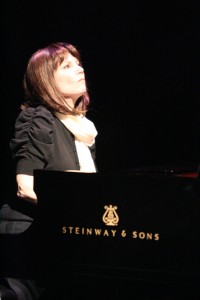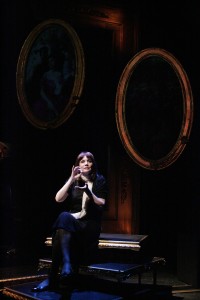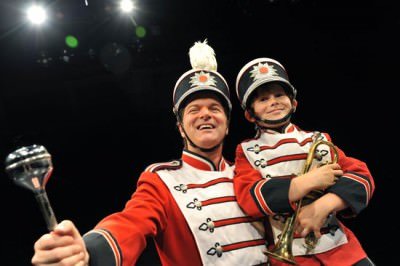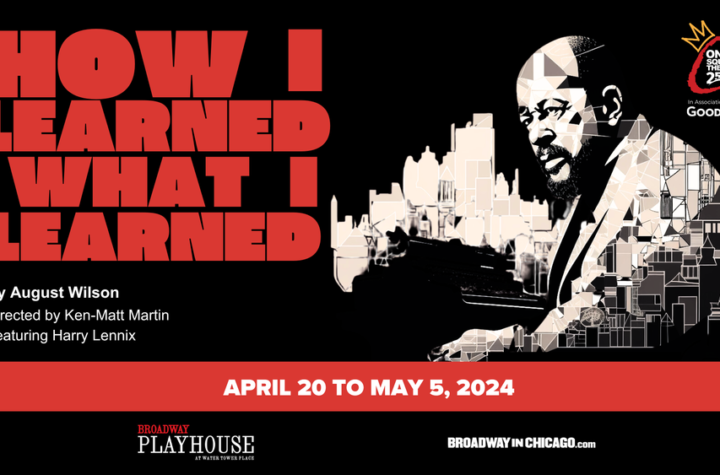
 [rating=5] Over the years, Chicago theater patrons have learned to fall in love with the works of Hershey Felder, who has become the musicians that he portrays. Not just with his beautiful piano playing, but with his words and the imagery he creates on stage. With this in mine, he is now stepping back into another chair; one of creator and director, so that he can bring other historical stories to the stage. What was witnessed tonight, at the intimate Royal George Theatre ( Felder’s home away from home) is the story of a young woman, one whose dream was to be a concert pianist,and how the Second World War, dismantled her life, but not her dream, “The Pianist of Willesden Lane”.
[rating=5] Over the years, Chicago theater patrons have learned to fall in love with the works of Hershey Felder, who has become the musicians that he portrays. Not just with his beautiful piano playing, but with his words and the imagery he creates on stage. With this in mine, he is now stepping back into another chair; one of creator and director, so that he can bring other historical stories to the stage. What was witnessed tonight, at the intimate Royal George Theatre ( Felder’s home away from home) is the story of a young woman, one whose dream was to be a concert pianist,and how the Second World War, dismantled her life, but not her dream, “The Pianist of Willesden Lane”.
Based on the book, “The Children of Willesden Lane” by Mona Golabeck and Lee Cohen, this 90 minutes is sheer artistry, by the clever adaptation by Felder and the stunning performance by Golabeck. After all, this is her mother’s story and she tells it with great heart and when she sits at The Steinway, I for one can see the emotions that cross her mind as she tells this story of hope, dreams and survival. She opens the play by introducing us to the portrait of the times- that we begin in Vienna in 1938. Her mother, was one of three daughters, but the only one that had the talent of her mother at the piano. All her life, that was her dream- to be a concert pianist. Her mother’s name was Lisa Jura. Her dream was to play in concert at Musikvere. When Lisa goes to her final lesson, filled with happiness, she is greeted at the door of her teacher by a German soldier, and finds that her teacher can no longer teach her, because she is Jewish.
Despondent, she returns home to her family, but each day, continues to practice. And as time goes on and the Germans become more ruthless, her parents attempt to get their daughters out of Vienna. Her father gambled for a ticket on the “Kinder Transport” ( these were trains that children were placed and sent to London on. Three daughters, one ticket. How can a mother decide? Lisa was chosen and made the trip. Her life was different in London. She worked and studied and of course, practiced the piano. While her life was unsettled, her faith and her dream stayed alive, and in her mind, one day, she would play a concert and her family would be with her.
In London, during the Blitzkrieg, the hostel where she resided was bombed, but the owner, Mrs. Cohen, said that she would repair the damage and bring all of her “kinder” back. This was done and as the months went on, Lisa continued to practice the piano and work. Then came an audition with the Royal Academy, which she passed and during her studies, instead of working in a factory, she was given a job at one of the ritzy hotels in the West End where she played music for the troops. One of the French officers decided that this was the woman for her and not wanting to spoil the story for you, I will only tell you that despite all the hardship of her life and the fear of what the next day may bring, The ending is a 4 tissue moment, with some surprises that will bring another tear to your eys!
The music you will hear is wonderful, but the presentation far exceeds the expectations one might have walking into the theater. Felder has such a dramatic flair in his direction and staging, that even the pauses, where you want to applaud, are timed so that you don’t want to spoil the moment that he has created. Pure genius, not only when he performs but as a writer and director. Golabek is a sensational performer and watching her hands on the keyboard is worth the price of the ticket alone. I guess her grandmother knew what she was doing when she was forced to make that choice. Their message- power in the arts, in particular through music, is well presented. This is a MUST SEE!
A moment to add the technical staff and the beauty of the work they do to make sure that this production is complete in every way.The set by David Buess and Trevor Hay, is simple and elegant, the projections by Greg Sowizdrzal and Andrew Wilder are wonderful photos and are timed to perfection with the story and the music. The sound by Erik Carstensen makes every word and every note heard no matter where in the theater you sit. By the way, there are no bad seats at The Royal George, which is probably why Felder has chosen to make this his second home.
The production will only be here through May 12th, so I suggest you do not wait to order your tickets. Production times are as follows:
Wednesdays and Thursdays at 7:30 p.m.
Fridays at 8 p.m.
Saturdays at 2 p.m. and 8 p.m.
Sundays at 3 p.m.
Tickets range from $44-$49 ( a true bargain for a show of this quality) and can be purchased at the Royal George box office located at 1641 N. Halsted Street, by phone at 312-988-9000 or online at www.theroyalgeorgetheatre.com
To see what others say, visit www.theatreinchicago.com, go to review round-up and click on “The Pianist of Willesden lane”






More Stories
“Joe Turner’s Come and Gone”
“How I Learned What I Learned” reviewed by Julia W. Rath
“How to Know the Wild Flowers: A Map” reviewed by Julia W. Rath